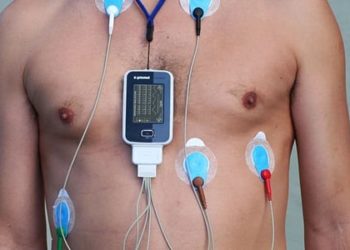Direct oral anticoagulants more effective in patients with valvular atrial fibrillation
1. Patients who received a direct oral anticoagulant had a lower risk of thromboembolic events and major bleeds compared to patients who received warfarin.
2. The between-group differences were consistent across all prespecified clinically relevant subgroups.
Evidence Rating Level: 2 (Good)
Study Rundown: It is recommended for patients with atrial fibrillation to receive prophylactic anticoagulant therapy to guard against an increased risk of stroke and other thromboembolic events. Numerous studies have demonstrated direct oral anticoagulants (DOACs) have greater antithrombotic effects and lower bleeding risk compared to warfarin in patients with nonvalvular atrial fibrillation. However, little direct evidence exists to confirm the efficacy and safety of DOACs in patients with both atrial fibrillation and valvular heart disease. In this new-user study involving over 55,000 patients with valvular atrial fibrillation, those who received a DOAC had a significantly lower risk for both major bleeding (gastrointestinal or intracranial) and the composite of ischemic stroke or systemic embolism (SE). These findings were robust in sensitivity analyses, consistent across demographic and clinical variables, and largely independent of the specific DOAC used (apixaban, rivaroxaban, dabigatran, or edoxaban). The study was limited by the lack of data regarding the concomitant use of over-the-counter drugs and the severity of valvular disease. Overall, these results contribute to the pool of observational evidence that supports the consideration of DOACs as a treatment option for patients with valvular atrial fibrillation.
Click here to read the study in Annals of Internal Medicine
In-Depth [retrospective cohort]: This study identified 46,276 new users of DOACs and 34,967 new users of warfarin. Patients who were 18 years or older and had a valvular heart disease diagnosis were included in the study. The study exclusion criteria included end-stage renal failure, history of stroke or systemic embolism, and heart valve replacement. The primary effectiveness outcome was a composite of ischemic stroke or SE, while the primary safety outcome was a composite of intracranial or gastrointestinal bleeding. At the end of the study, 787 DOAC users had stroke or SE after a median follow-up of 134 days (3.9 events per 100 person-years) compared to 1,211 warfarin users after a median follow-up of 124 days (6.0 events per 100 person-years). This corresponded to a hazard ratio of 0.64 (95% confidence interval [CI], 0.59 to 0.70) and an absolute reduction in the probability of stroke or SE with DOACs compared with warfarin of 0.015 within 6 months and 0.026 within 1 year. For the risk of major bleeding, 1,465 DOAC users had an event (7.1 events per 100 person-years) compared to 2,155 warfarin users (10.6 events per 100 person-years). This corresponded to a hazard ratio of 0.67 (95% CI, 0.63 to 0.72) and an absolute reduction in the probability of major bleeding of 0.019 within 6 months and 0.035 within 1 year. These differences persisted across subgroups defined by age, sex, cancer, abnormal coagulation, and type of valvular heart disease. Overall, the study determined DOAC lowered the risk of ischemic stroke SE in patients with valvular atrial fibrillation.
Image: PD
©2021 2 Minute Medicine, Inc. All rights reserved. No works may be reproduced without expressed written consent from 2 Minute Medicine, Inc. Inquire about licensing here. No article should be construed as medical advice and is not intended as such by the authors or by 2 Minute Medicine, Inc.







